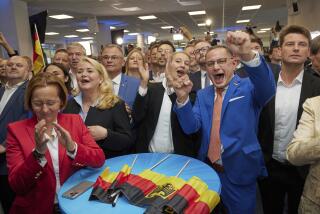EU Observers Report a Flawed Poll in Pakistan
- Share via
ISLAMABAD, Pakistan — European observers sharply criticized President Pervez Musharraf’s government Saturday for a range of flaws in last week’s general election and questioned whether the military will allow real civilian rule in Pakistan.
A team of European Union observers scrutinized the promised transition to civilian democracy by Musharraf -- an army general who seized power in a 1999 bloodless coup -- for 10 weeks before Thursday’s vote. Their report supported opposition complaints of widespread manipulation.
While he blamed a succession of civilian and military governments for failing to foster true democracy in Pakistan, chief election observer John Cushnahan said he doubted that Musharraf’s plan is much different.
“Any abuse of power, whether for monetary gain or anything else, should be addressed by firm and impartial application of the rule of law, not by unjustified interference with electoral arrangements and the democratic process,” Cushnahan said. “Regrettably, in choosing the latter course, the Pakistan authorities engaged in a course of action which resulted in serious flaws in the electoral process.”
With most votes counted Saturday, no single party had won enough seats in the 342-member National Assembly to form a government without support from coalition partners. That means a new government can emerge only after hard bargaining, and covert U.S. operations in Pakistan in the war against terrorism are likely to be one of the issues on the table.
The pro-Musharraf Pakistan Muslim League-Q had the most seats, with 78. The Pakistan People’s Party of former Prime Minister Benazir Bhutto, who is in self-exile in London to avoid prison on corruption charges, had 62 seats. A loose alliance of six anti-American Muslim parties, the Muttahida Majlis-i-Amal, or United Council of Action, had 45.
Of the 342 seats in the assembly, 272 are elected by constituents while the rest are reserved for women and minorities.
As the third-largest contingent in the legislature, the Islamic front is not guaranteed a role in the federal government. But to shut it out completely, the pro-Musharraf PML-Q would have to form a coalition with its political archenemy, Bhutto’s party.
An accommodation with the mullahs, who have long had ties to the Pakistani military, would probably be easier to negotiate. The Islamic front won an outright majority in the provincial assembly in North-West Frontier Province, and it might also hold the balance of power in the provincial government in Baluchistan.
Both territories border Afghanistan and are crucial to U.S.-led efforts to capture Taliban and Al Qaeda fighters believed to be using Pakistani border areas as rear bases for a guerrilla war in Afghanistan.
On Friday, Islamic front leader Shah Ahmed Noorani predicted that the religious parties would lead a coalition government in Pakistan. But despite the Islamic alliance’s public support for the ousted Taliban regime in neighboring Afghanistan, Pakistani clerics have said any moves they would make against what they consider vulgar Western cultural influences, such as cable TV, would be gradual.
Support for Islamic candidates was so strong that the former leader of a banned militant group won a seat in the National Assembly while locked up in a jail cell. Azam Tariq headed the outlawed Sipah-e-Sahaba, a Sunni Muslim organization blamed for scores of terrorist attacks aimed at minority Shiite Muslims.
Musharraf’s government hasn’t said publicly what it plans to do about the election of Tariq, who ran as an independent. But Musharraf’s opponents have accused his military’s powerful Inter-Services Intelligence agency of waging a secret campaign to weaken mainstream parties and promote his allies. That may have backfired by opening the way to sweeping gains by Islamic parties, which oppose Musharraf’s alliance with the U.S. in the war on terrorism.
In his report, Cushnahan, a member of the European Parliament from Belfast, Northern Ireland, echoed the concerns of Pakistani opposition parties and human rights activists who say the military plans to wield significant power over the new civilian government.
The “restoration of democracy in this country is about the transfer of power from a military to a civilian administration,” Cushnahan said in the report. “The powers that have been reserved to the president and the National Security Council raise serious questions as to whether or not this will happen.”
The EU observers concluded that Musharraf imposed new election rules to keep Bhutto and exiled former Prime Minister Nawaz Sharif, the country’s two best-known politicians, out of the race. Those decrees “were based on questionable legal grounds and clearly had a negative impact on the overall electoral process,” the report said.
The observers found that Pakistan’s election commission, which is supposed to be independent, “failed to curb the authorities’ misuse of state resources in favor of political parties,” including the PML-Q. Government-imposed restrictions “seriously hampered the abilities of parties and candidates to campaign and contributed to the lackluster pre-polling period,” the report concluded.
At the same time, the PML-Q and the Islamic front got much more coverage on state-run television than mainstream opposition parties, the observers found.
“Broadcasts containing dissent or criticism of the authorities were the exception rather than the rule,” the report said. “The administration was often given free rein on state television to criticize the behavior of past political rulers, including President Musharraf’s inappropriate eve-of-election televised address to the nation.”
More to Read
Sign up for Essential California
The most important California stories and recommendations in your inbox every morning.
You may occasionally receive promotional content from the Los Angeles Times.










